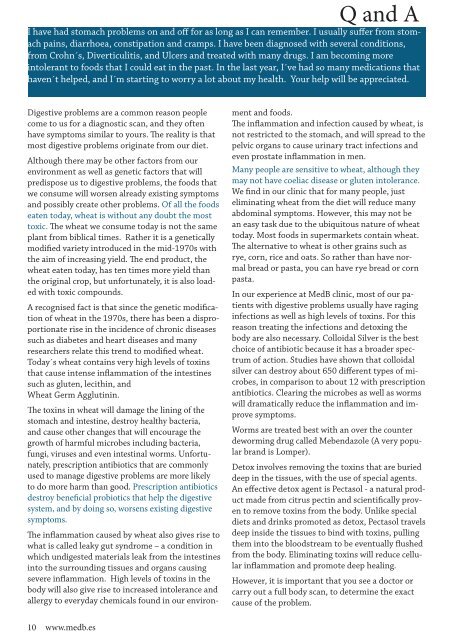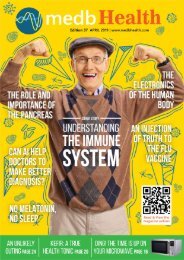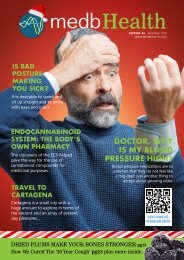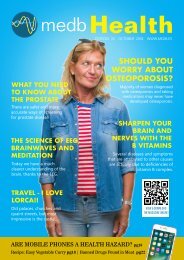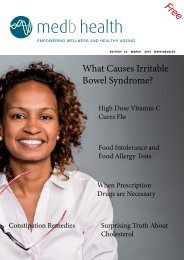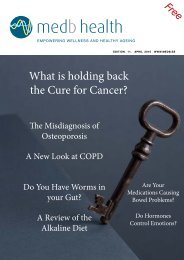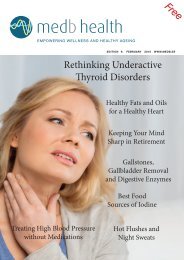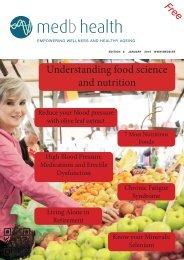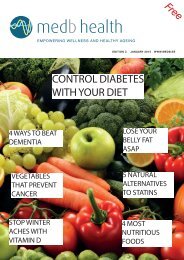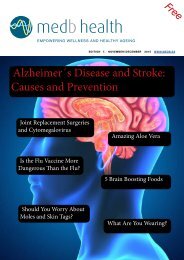Preventing Alzheimer's Disease and Stroke
There is strong clinical evidence that chronic diseases of the brain can be prevented and even reversed.
There is strong clinical evidence that chronic diseases of the brain can be prevented and even reversed.
Create successful ePaper yourself
Turn your PDF publications into a flip-book with our unique Google optimized e-Paper software.
Q <strong>and</strong> A<br />
I have had stomach problems on <strong>and</strong> off for as long as I can remember. I usually suffer from stomach<br />
pains, diarrhoea, constipation <strong>and</strong> cramps. I have been diagnosed with several conditions,<br />
from Crohn´s, Diverticulitis, <strong>and</strong> Ulcers <strong>and</strong> treated with many drugs. I am becoming more<br />
intolerant to foods that I could eat in the past. In the last year, I´ve had so many medications that<br />
haven´t helped, <strong>and</strong> I´m starting to worry a lot about my health. Your help will be appreciated.<br />
Digestive problems are a common reason people<br />
come to us for a diagnostic scan, <strong>and</strong> they often<br />
have symptoms similar to yours. The reality is that<br />
most digestive problems originate from our diet.<br />
Although there may be other factors from our<br />
environment as well as genetic factors that will<br />
predispose us to digestive problems, the foods that<br />
we consume will worsen already existing symptoms<br />
<strong>and</strong> possibly create other problems. Of all the foods<br />
eaten today, wheat is without any doubt the most<br />
toxic. The wheat we consume today is not the same<br />
plant from biblical times. Rather it is a genetically<br />
modified variety introduced in the mid-1970s with<br />
the aim of increasing yield. The end product, the<br />
wheat eaten today, has ten times more yield than<br />
the original crop, but unfortunately, it is also loaded<br />
with toxic compounds.<br />
A recognised fact is that since the genetic modification<br />
of wheat in the 1970s, there has been a disproportionate<br />
rise in the incidence of chronic diseases<br />
such as diabetes <strong>and</strong> heart diseases <strong>and</strong> many<br />
researchers relate this trend to modified wheat.<br />
Today´s wheat contains very high levels of toxins<br />
that cause intense inflammation of the intestines<br />
such as gluten, lecithin, <strong>and</strong><br />
Wheat Germ Agglutinin.<br />
The toxins in wheat will damage the lining of the<br />
stomach <strong>and</strong> intestine, destroy healthy bacteria,<br />
<strong>and</strong> cause other changes that will encourage the<br />
growth of harmful microbes including bacteria,<br />
fungi, viruses <strong>and</strong> even intestinal worms. Unfortunately,<br />
prescription antibiotics that are commonly<br />
used to manage digestive problems are more likely<br />
to do more harm than good. Prescription antibiotics<br />
destroy beneficial probiotics that help the digestive<br />
system, <strong>and</strong> by doing so, worsens existing digestive<br />
symptoms.<br />
The inflammation caused by wheat also gives rise to<br />
what is called leaky gut syndrome – a condition in<br />
which undigested materials leak from the intestines<br />
into the surrounding tissues <strong>and</strong> organs causing<br />
severe inflammation. High levels of toxins in the<br />
body will also give rise to increased intolerance <strong>and</strong><br />
allergy to everyday chemicals found in our environment<br />
<strong>and</strong> foods.<br />
The inflammation <strong>and</strong> infection caused by wheat, is<br />
not restricted to the stomach, <strong>and</strong> will spread to the<br />
pelvic organs to cause urinary tract infections <strong>and</strong><br />
even prostate inflammation in men.<br />
Many people are sensitive to wheat, although they<br />
may not have coeliac disease or gluten intolerance.<br />
We find in our clinic that for many people, just<br />
eliminating wheat from the diet will reduce many<br />
abdominal symptoms. However, this may not be<br />
an easy task due to the ubiquitous nature of wheat<br />
today. Most foods in supermarkets contain wheat.<br />
The alternative to wheat is other grains such as<br />
rye, corn, rice <strong>and</strong> oats. So rather than have normal<br />
bread or pasta, you can have rye bread or corn<br />
pasta.<br />
In our experience at MedB clinic, most of our patients<br />
with digestive problems usually have raging<br />
infections as well as high levels of toxins. For this<br />
reason treating the infections <strong>and</strong> detoxing the<br />
body are also necessary. Colloidal Silver is the best<br />
choice of antibiotic because it has a broader spectrum<br />
of action. Studies have shown that colloidal<br />
silver can destroy about 650 different types of microbes,<br />
in comparison to about 12 with prescription<br />
antibiotics. Clearing the microbes as well as worms<br />
will dramatically reduce the inflammation <strong>and</strong> improve<br />
symptoms.<br />
Worms are treated best with an over the counter<br />
deworming drug called Mebendazole (A very popular<br />
br<strong>and</strong> is Lomper).<br />
Detox involves removing the toxins that are buried<br />
deep in the tissues, with the use of special agents.<br />
An effective detox agent is Pectasol - a natural product<br />
made from citrus pectin <strong>and</strong> scientifically proven<br />
to remove toxins from the body. Unlike special<br />
diets <strong>and</strong> drinks promoted as detox, Pectasol travels<br />
deep inside the tissues to bind with toxins, pulling<br />
them into the bloodstream to be eventually flushed<br />
from the body. Eliminating toxins will reduce cellular<br />
inflammation <strong>and</strong> promote deep healing.<br />
However, it is important that you see a doctor or<br />
carry out a full body scan, to determine the exact<br />
cause of the problem.<br />
10 www.medb.es<br />
MedMag_Vol7.indd 10 05/11/2015 15:50:50


